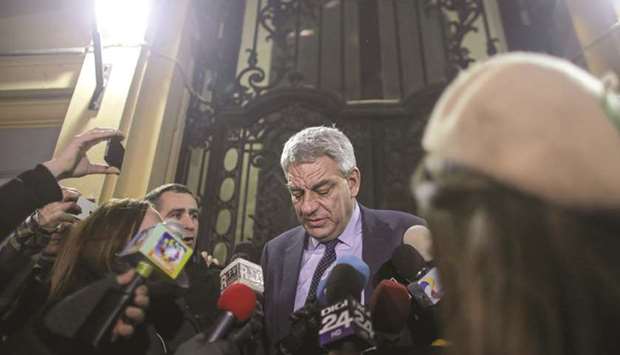“Mrs Dancila has been an MEP since 2009, she is respected in Brussels, she doesn’t seek conflict, is communicative and has good relations with the (European) Commission,” PSD leader Liviu Dragnea said after a party meeting in Bucharest.
Dragnea said that the choice is a “clear signal to Brussels, because we want to improve relations between the government and the Commission” following recent tensions over legislation seen by the EU as potentially weakening the battle against corruption.
Assuming Dancila, 54, is approved by President Klaus Iohannis today, she will also become the first woman to head the government of the European Union’s second-poorest country after Bulgaria.
Mihai Tudose, 50, announced his resignation as prime minister late on Monday after senior members of the PSD voted to withdraw their support.
Tudose was the second PSD-appointed premier to go after his predecessor Sorin Grindeanu’s government was torpedoed by the party following a no-confidence motion last June.
Both appeared to have fallen out with Dragnea, 55, who is himself barred from public office because of an electoral fraud conviction, but who still calls the shots as head of the party.
Dragnea said on Monday that he had “made two bad choices” for prime minister, adding that he would not make the same “mistake”.
In a recent television interview, Tudose had slammed Dragnea for taking key decisions without consulting other senior party members.
Things took a turn for the worst last week when Tudose demanded the resignation of Interior Minister Carmen Dan, a Dragnea ally, after a paedophilia scandal involving Romania’s police force.
Yesterday the centre-right Iohannis, a fierce critic of the PSD, formally accepted Tudose’s resignation and put forward Mihai Fifor, defence minister, as interim prime minister.
“We need a new government quickly so that this period of uncertainty doesn’t translate into political instability,” Iohannis said, adding that he was “unhappy and concerned”.
The PSD returned to power in December 2016 after a thumping election victory on promises of boosting wages and pensions and slashing taxes, but it almost immediately hit problems.
In February 2017, the government scrapped proposed changes to anti-corruption laws that would have let politicians off the hook after the biggest protests since the ouster of communist dictator Nicolae Ceausescu in 1989.
Dancila, the new prime minister designate, had staunchly defended the legislation.
Fresh demonstrations have also greeted other changes that critics – including Brussels and Washington – worry will weaken the battle against rampant graft.
That legislation has passed through both houses of parliament and must be approved by the president.
Romania’s economic growth has been among the strongest in the European Union, meanwhile, expanding at an annual rate of almost nine per cent in the third quarter.
Tudose’s resignation also prompted visiting Japanese Prime Minister Shinzo Abe, on the final stop of a European tour, to cancel talks with the Bucharest government, Romanian officials said.
Abe, who arrived in Bucharest yesterday on the first ever visit to Romania by a Japanese premier, was due however to meet with President Iohannis.

